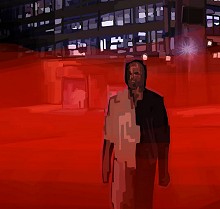|
Waking Life
|
| |
|

|
USA,
2001. Rated R. 99 minutes. Written and directed by Richard Linklater.
This analysis is divided into an introduction
and four parts that may be read independently or sequentially.
I. The
Making of Waking Life
II. The Play-by-Play
III. What It All Means
IV. Yeah, But Is It Any Good?
Parts II, III, and IV contain spoilers
and are intended for people who have already seen the film.
LINKS
|
| Grade:
C |
Analysis and commentary
by Carlo Cavagna |
Back to Introduction
Back to Part I
Back to Part II
Back to Part III
IV. Yeah, But Is It Any Good?
A Critical Commentary
 here
is no dispute: Waking Life is an innovative film. Intelligent, challenging,
noble--these words could also be used to describe it. However, other words can
legitimately be used to describe Waking Life, too: confused, unfocused,
superficial, pretentious. Intelligence and nobility of purpose are enough to
make a film not bad, but they aren't in themselves enough to make a film good.
here
is no dispute: Waking Life is an innovative film. Intelligent, challenging,
noble--these words could also be used to describe it. However, other words can
legitimately be used to describe Waking Life, too: confused, unfocused,
superficial, pretentious. Intelligence and nobility of purpose are enough to
make a film not bad, but they aren't in themselves enough to make a film good.
Let's talk about the story. As the thematic description and analysis in Parts
II and III should make clear, there barely
is one. A guy tries to figure out if he's dreaming or awake. His journey amounts
to bumping into dozens of random people, who assault him with their views on
life and consciousness. Who is this guy? He's everyone and no one. He mostly
just listens, the way Linklater hopes the audience will listen--he's not a character,
but a surrogate for us, the viewers. Through him, the other characters talk
to us, or more precisely, at us. Since we don't know anything about this
non-character, we have no emotional stake in his fate. Why should we care if
he's alive or dead? The subject of dreams (what are they? where do they come
from? what do they mean?) is a fascinating one, but the issue of whether this
particular person is dreaming or awake, is not.
In a sense, Waking Life is more a documentary than a work of fiction,
because most of the speakers play themselves and talk about their real views.
But what is Waking Life documenting? Though Waking Life has a
point of view, it doesn't have a cohesive argument or reach any clearly thought-out
conclusions. Mostly it is documenting a bunch of people's thoughts on free will
and dreams, and arguing that the issues it raises are exciting and important.
However, just because we should spend time thinking about the themes
covered in Waking Life doesn't mean it's fun being told to do so over
and over.
Sometimes, watching Waking Life is provocative and riveting; other times,
it is like being unable to escape a party full of name-dropping, black turtleneck-clad
intellectuals in John Lennon glasses, all talking at you in turn. (And, unlike
such a party, you can't even jump in with your own thoughts.) The film is circular
and repetitive, working the same ground over and over again.  Some
fascinating ideas are developed, but it's a lot of work to pull out the common
threads. Like a dream, Waking Life is not a logical progression of conversations.
The thoughts in Waking Life do not so much build to something as they
just kind of amass in a big pile.
Some
fascinating ideas are developed, but it's a lot of work to pull out the common
threads. Like a dream, Waking Life is not a logical progression of conversations.
The thoughts in Waking Life do not so much build to something as they
just kind of amass in a big pile.
Every once in awhile, a movie comes out that has critics falling over themselves
to prove how intellectual they are and launch into the usual diatribes about
how Hollywood just doesn't get it (often true, but not always). Waking Life
is such a movie. It's ordained as a Major Achievement because it deals with
Important Things and is Intelligent, regardless of how accomplished a film it
actually is.
Even so, without the extraordinary animation, it's a good bet that at least
some of those same critics would be falling over themselves to denounce Waking
Life. Imagine if Waking Life had been released as the live-action
film it was before it was painted over. The aimlessness and repetitiveness would
be laid bare. Some may say that the animation is an intrinsic part of Waking
Life, inseparable from the rest of the film. Bollocks. I've just separated
them in the analysis, haven't I? Waking Life
is not a painting, or even a gallery of paintings. It is a film. The animation
is the form, and the content is the substance.
If it were true that the visuals and the content are inseparable, you would
have to be able to say that the visual elements do more than enhance and communicate
the ideas that are already there. This is the case with a movie like Wings
of Desire, whose visual elements are the story and thematic content. Reading
the script would tell you almost nothing about the film. Reading the script
of Waking Life would tell you everything about the film except what it
looks like, impressive as that look may be. To declare Waking Life a
great film because of how it looks is to prioritize form over substance.
Looking past the animation, Waking Life is quite similar to Linklater's
previous films. If the idea of a guy wandering around and encountering a bunch
of people who tell him peculiar stuff sounds familiar, it's because Linklater
employed pretty much the same sprawling structure in his debut, Slacker.
Except for The Newton Boys (a straightforward crime caper), he hasn't
deviated much from that structure. Heck, Slacker begins with a young
traveler waking on a bus and describing his dream to a taxi driver who picks
him up at the station--not so different from Waking Life. Two years after
Slacker came Dazed and Confused, another sprawling film in which
people do a lot of hanging out and talking. Linklater's next film was Before
Sunrise, in which Hawke and Delpy spend all night conversing as they roam
the streets of Vienna. In subUrbia…more aimless hanging around and talking.
Aside from its style and narrative structure, Waking Life contains several
references to and elements in common with Linklater's earlier films. Characters
and actors reprise roles, locations are reused (the Circle A convenience store
from subUrbia, the Paramount Theater from The Newton Boys), and
the same ideas come up. Waking Life is part of the same cinematic continuum,
which may mean that Linklater has a unified artistic vision, or it may mean
that he is overly obsessed with his previous works, like Kevin Smith.
Linklater's work is governed by film theorist André Bazin's concept of "cinema
de la realité." Bazin's belief that movies should forget about narrative and
try to reproduce reality in order to capture the "holy moment" (see scene 20)
is a virtuous one, but it's also quite constricting, particularly if, like Linklater,
you take it to mean that you should just follow people around with a camera
and record conversations in all your films, regardless of whether there's a
story or even a point. Cinema has quite decisively proved that it is
a storytelling medium, neither qualitatively better nor worse than the stage
or the novel, just different. Bazin's ideas cannot have been quite so
rigid, though, if one his favorite films was Citizen Kane, a film full
of story, unusual though the narrative structure may be. There is room in moviedom
for both cinema de la realité and traditional storytelling. The cinema
would fast become a dreary art form if all films were made according to the
same principles and ideas.
There is a point to Waking Life, despite what one may assume
after having read this far. To suggest otherwise is unfair. The overarching
message is an existential one--that we should refuse to be passive observers
in the world, appreciate every moment, and live our lives to the fullest. This
is no different from the core message of dozens of other recent movies, such
as American Beauty, though Waking
Life goes further in an anti-societal, anarchist direction. Waking Life
fuses its existential message with ideas taken from Jung and his descendants,
arguing that all reality is subjective and that dreams can be the portal to
existential self-individuation and enlightenment.
Waking Life's most immediate purpose, however, is to awaken interest
in philosophy, psychology, and physics, challenging people to think about metaphysical
issues they normally ignore. It simply appears that Linklater has made some
baffling choices in pursuit of that goal. The characters don't talk like normal
people; they race through ideas and drop dozens of Big Names. The film covers
so much ground that many concepts are treated superficially, which, as one member
of the AboutFilm Movie
Boards community has cuttingly remarked, results in "cartoon philosophy"
from "cartoon intellectuals." (Okay, so this isn't cartoon animation, but the
quote sounds good that way.) The ideas come fast and furious, and in no apparent
order. Unless you are a scholar of philosophy or psychology, the only way to
sort it all out is to see the movie more than once, take reams of notes, and
research all the names and ideas you don't recognize.
So how does Linklater hope to connect with an audience not already interested
in these ideas? No doubt through the groovy animation, but the animation does
not suffice. Waking Life comes off as a documentary of stuff Linklater
finds interesting and a laundry list of Impressive Authors he's read, replete
with references to his previous films. As such, it's an incredibly self-involved
piece of filmmaking.  Linklater
seems more concerned with hearing himself speak than communicating. If you aren't
already interested, he probably won't draw you in.
Linklater
seems more concerned with hearing himself speak than communicating. If you aren't
already interested, he probably won't draw you in.
More damningly, Waking Life is a shamelessly elitist film. One of the
first speeches in the film is about how existentialism is misunderstood, but
that presupposes that existentialism is understood in the first place. Sartre,
Nietzsche, Kierkegaard, Debord…Waking Life mentions the names but provides
no background. If Linklater hopes to inspire people who don't normally think
about such things, talking over their heads is not an effective tactic. The
inclusion of Louis Mackey's remark that the gap between Plato and Nietzsche
and the average human is greater than the gap between the average human and
a chimp betrays Linklater's true regard for the people he's presumably trying
to reach.
Mackey also wonders whether the most universal human characteristic is fear
or laziness. In Linklater's case, it must be laziness, because if he had made
more of an effort to marshal his thoughts into a coherent movie, he might be
doing more than attracting the interest of people who are already interested.
Like the animation, the ideas in Waking Life float about without an anchor.
The fact that Linklater has structured his movie as a dream is no excuse. We
are not all dream psychologists. Complex questions and challenging ideas are
welcome, but Linklater's choices have narrowly confined his audience to people
who already think like he does and see the world like he does.
Linklater has bothered, however, to include some clever postmodern remarks
in Waking Life to fend off criticism. At the end of the film (scene 33)
Linklater himself says that, yeah, he knows listening to another person's dream
isn't usually very interesting. Before that, Soderbergh's anecdote about Wilder
and Malle disparages movies about dreams, ha, ha. The woman who talks about
language comments, "Words are inert--they're dead." Despite such disarming quips,
words are what Waking Life is, and all the undulating, oscillating imagery
in the world cannot bring them to life.
Waking Life talks about identity, dreams, consciousness, and free will.
Other movies--even popular movies like Blade
Runner, Dark City, 2001: A Space Odyssey,
and A.I.--actually deal with those issues. They are movies that
draw us in with character and story in order to probe the nature of consciousness
and identity with us, testing our generally-accepted definitions and taking
clear positions of their own. The newly released Vanilla
Sky (a big-budget Hollywood film, no less!) deals with precisely
the same themes of reality's subjectivity and self-individuation through dreams.
It, however, manages to construct an actual story out of the same concepts Linklater
finds so fascinating. (One might say the same about Donnie Darko and
Mulholland Drive.) The animation
in Waking Life is worth seeing, and the issues it raises are worth pondering.
When it comes to cinematic explorations of these issues, though, the storytelling
and communication of those other films is like the transcendent connection one
finds in making love to a devoted partner. By comparison, Waking Life
amounts to little more than isolated--and not terribly fulfilling--masturbation.
Back to Introduction
Analysis and commentary ©
January 2002 by AboutFilm.Com and the author.
Images © 2001 Fox and its related entities. All Rights Reserved.

 Some
fascinating ideas are developed, but it's a lot of work to pull out the common
threads. Like a dream, Waking Life is not a logical progression of conversations.
The thoughts in Waking Life do not so much build to something as they
just kind of amass in a big pile.
Some
fascinating ideas are developed, but it's a lot of work to pull out the common
threads. Like a dream, Waking Life is not a logical progression of conversations.
The thoughts in Waking Life do not so much build to something as they
just kind of amass in a big pile.
 Linklater
seems more concerned with hearing himself speak than communicating. If you aren't
already interested, he probably won't draw you in.
Linklater
seems more concerned with hearing himself speak than communicating. If you aren't
already interested, he probably won't draw you in.
